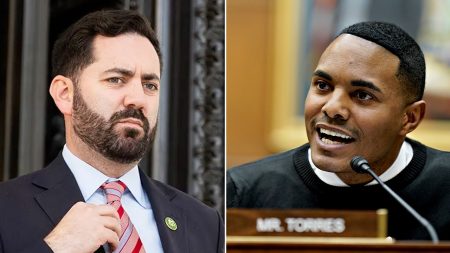A coalition of Republican attorneys general from 17 states filed a lawsuit against the Equal Employment Opportunity Commission over a new rule requiring employers to provide abortion accommodations under the Pregnant Workers Fairness Act. The rule mandates that most employers offer “reasonable accommodations” related to pregnancy or childbirth, including time off for an abortion, but does not require payment for the procedure. The attorneys general argue that the EEOC is overstepping its authority and turning the protections for pregnant workers into an abortion mandate, which goes against the intent of the law.
Alabama, Arkansas, Florida, Georgia, Idaho, Indiana, Iowa, Kansas, Missouri, Nebraska, North Dakota, Oklahoma, South Carolina, South Dakota, Utah, West Virginia, and Tennessee are part of the coalition challenging the EEOC rule. They believe it constitutes an unconstitutional federal overreach and infringes on existing state laws. The attorneys general argue that the EEOC is overreaching its authority and exceeding the scope of the agency’s power by requiring employers to accommodate elective abortions, which the Pregnant Workers Fairness Act did not authorize.
The final rule clarifies provisions of the Pregnant Workers Fairness Act, which Congress passed as part of a federal government spending package in late 2022. The law applies to employers with at least 15 workers and provides protections for pregnant and postpartum workers, including time off for recovery from childbirth, prenatal appointments, accommodations related to seating and breaks, and protections for breastfeeding and miscarriage. Employers are not required to offer paid time off under the act.
The debate over whether abortion should be included in the act’s definition of “pregnancy, childbirth, or related medical conditions” garnered thousands of comments to the commission. While about 54,000 urged the exclusion of abortion, around 40,000 asked for its inclusion. The EEOC clarified in the final rule that the law does not require a job-based health plan to pay for any procedure, including an abortion. In a statement, the agency emphasized that the act is a workplace anti-discrimination law with narrow requirements related to abortion, likely only involving a request for leave from work.
The EEOC referred a request for comment to the Department of Justice, which did not immediately respond to the lawsuit filed by the coalition of Republican attorneys general. The attorneys general argue that the EEOC is rewriting the bipartisan Pregnant Workers Fairness Act to mandate abortions, which is not what the law intended. They believe the EEOC is overstepping its authority and infringing on the rights of states to regulate such matters. The legal challenge will likely bring further attention to the issue of abortion accommodations in the workplace and the interpretation of the Pregnant Workers Fairness Act.
In conclusion, the lawsuit filed by a coalition of Republican attorneys general against the Equal Employment Opportunity Commission challenges a new rule requiring employers to provide abortion accommodations under the Pregnant Workers Fairness Act. The attorneys general argue that the EEOC is overstepping its authority and turning the protections for pregnant workers into an abortion mandate, contrary to the intent of the law. The legal challenge will likely spark further debate and discussions on the inclusion of abortion in workplace accommodations and the scope of the Pregnant Workers Fairness Act.













